The Super Bowl Catch that Wasn't
How many people unwittingly contributed to a play that changed history - and enabled so much good to come from it.
It’s Super Sunday, so I’ve got a Super Bowl-related parable to share. (I’m allowed to say “Super Bowl,” right?) Apologies to those who have no interest in football or the Book of Genesis. The football will all be over with after today! But the stories will live on.
And if you haven’t yet seen my Annual Super Bowl Prediction (Based on Biblical and Other Sources), check it out here.
It was one of host of clutch plays an unheralded rookie receiver made during the greatest comeback in Super Bowl history, a play that was absolutely necessary. Watch this catch by Malcolm Mitchell in Super Bowl 51.
The score was 28-12 at the time, midway through the fourth quarter, and New England faced a crucial third and 11 at the Atlanta 30.
I was thinking of Mitchell this past week while watching a replay of that famous comeback, pondering all the little things that had to go right for the Patriots to pull it off. The Georgia native spent so little time with New England, yet for one game he stood so tall.
And then I saw it. That play.
When you watch the clip on the NFL.com highlight link, the catch seems to be perfect. But the video cuts away before a key replay, which you can only see in the full game broadcast, and there only briefly. At about the 1:43:20 mark, you’ll see the key play again. Wait for the second reply, at 1:44:03 - and you’ll see what I clipped in these screenshots below. The drop appears only for a second - literally - before FOX cuts backs to live action as the Patriots run up to the line to run the next play.
It’s clearly a drop.
Had Atlanta challenged the call, the catch likely would have been overturned, in which case the Patriots would have faced a 4th and 11 with their season on the line.
But no one noticed. I mean, to this day, I’ve never seen anyone talk about it. It’s nowhere to be found online. There’s even video of Mitchell watching a replay of the game a few years later, and when the play comes up, no one asks him about it whether he caught it.
It’s as if people see it but don’t want to believe it. Our brains can’t fathom something that would have changed the narrative so dramatically, and shockingly, given the precision with which we do sports these days.
Soon we won’t be relying on umpires to call balls and strikes in baseball and NFL replay may take away the guesswork on all those controversial roughing the passer and pass interference calls. But for now, sports still appeal to our most human qualities. It’s just about the only thing we watch live - in enormous numbers - where something can so quickly go off the rails (other than a Trump press conference).
I still smile in bemusement whenever I see Tom Brady telling the press with a smirk, after the Tuck Rule saved his season in 2002, “Uh…You know, he hit me. I wasn’t sure. Yeah, I was throwing the ball. How do you like that? Damn right. Damn right.” The alternate universes that would have emerged if that play had been called differently are almost unfathomable - and Brady and Charles Woodson tried to fathom them many years later.1
The Patriots rushing to get to the line for the next play after Mitchell’s catch (or drop) might have just been precautionary - as happened later on after Julian Edelman’s great catch. Or maybe on the sidelines they knew. In the broadcast booth, Troy Aikman remarked on how Mitchell might have placed the ball down prematurely, which could have resulted in a catastrophic fumble if he hadn’t bene touched yet by a defender. Maybe that was a deliberate distraction on Malcolm’s part. Mitchell has said he wanted to make sure he got a first down, so he stretched his arm out before putting the ball down. But he was easily beyond the first down marker.
My point is not to denigrate Mitchell. He made a number of clutch catches that day, the greatest game, by far, of his pro career. He deserves to be considered one of the great heroes of that comeback.
In fact, it was the CBS production and the Falcons coaches who “dropped the ball” on that play. Had the Patriots not rushed up to the line, and had Mitchell not handed the ball quickly to the referee, the TV replay would have stayed on for just a second longer, the Falcons would probably have called a time out - and history might well have turned out differently.
We often speak of the small actions and insignificant people that change everything. Like the unidentified man in Genesis 37, who appears out of the blue and directs Joseph to where his brothers are tending their flocks.
Who was this man? The medieval commentator Rashi says it was the angel Gabriel. Maybe he was an angel - or maybe he just owned the gas station on the outskirts of Shechem. We know nothing about him and he never appears again. But if he hadn’t sent Joseph in the direction of his scheming brothers, Jewish history (and therefore Christian and Muslim as well) would have ended right there. The story would have been stillborn. No Joseph in Egypt, no Jacob’s family resettling there, no slavery, no Exodus, no Red Sea, no Mount Sinai, and probably no 28-3 comeback for the Patriots.
Oh, and no “He gets us” Super Bowl ads.
But at least we know that that small deed happened. Small deeds make a huge difference. And most escape anyone’s notice.
We know about Jerry Kramer’s block in the Ice Bowl, allowing Bart Starr to score and the Packers to beat the Cowboys. We know about Dont'a Hightower’s strip sack in Super Bowl 51, just before Mitchell’s catch, but equally important was Hightower’s unheralded stop of Marshawn Lynch at the one yard line in Super Bowl 49, just before Malcom Butler’s interception-heard-round-the-world, “The Play Before the Most Pivotal Play in Super Bowl History.”
But think of the plays that we don’t know about, the ones that could be the most important of all. It just shows how the smallest things we do can make the most enormous difference, even if we have no idea that they happened. That’s what makes Mitchell’s play different from the others I just mentioned.
Mitchell either managed to miraculously hold onto that ball that seemed to be falling, or he pulled off a ruse that outwitted a gazillion cameras, a host of officials and a hundred million people watching at home. He stretched out the ball to divert attention, then handed it quickly to the ref as his teammates approached. His nonchalant poker face - if he was even aware of what had happened - required more skill than catching the ball.
Think of what that game meant for Mitchell himself.
His career was sadly shortened by knee injuries and he was cut by the Patriots a year later. But with his Super Bowl status in tow, Mitchell went on to do some wonderful things promoting children’s literacy back in his home of Atlanta, as an author, keynote speaker and Founder and CEO if the Share the Magic Foundation. His TEDx Talk is positively inspirational:
Because of his mastery of that moment, he helped Brady to achieve GOAT status, not at all a given had they lost that game (in which Brady threw a pick-six, don’t forget), and he returned to Georgia having branded his home town the NFL’s all-time greatest Super Bowl loser, carrying the 28-3 moniker that will never go away.
Mitchell has gone through adversity and deserves all the chances he’s getting to do good - and he’s making good on those opportunities.
Life is messy. There are clear penalties that aren’t called on nearly every play - like the obvious holding penalty (actually two choke holds, according to Patriots defensive end Jarvis Green2) that freed Eli Manning to throw that ball that David Tyree caught against his helmet in Super Bowl 42. One of the victims there was Mike Vrabel, who, under today’s rules, also could easily have been flagged for roughing the passer on the play that led to Ty Law’s game-changing interception for the Patriots against the Rams in Super Bowl 36.3
And there are questionable penalties that are called. For the Patriots, the all-time worst call was roughing the passer in the 1976 playoffs at Oakland.
Perhaps it’s that messiness that we love most about the game. The mud, the snow, the slippery balls, the human refs. The mysterious blackout that occurred when the Super Bowl was last in New Orleans. It’s not just about the catches. It’s also about the drops, and what you do with them and how you manage your moment in the spotlight. Despite all our efforts to achieve perfection, to have control, something slips past. It’s a perfect metaphor for life. We can never completely control things.
Something is not called. Something that shouldn’t be, is. And a ball that was dropped is not noticed by anyone.
Fact is, even with over 240 cameras covering today’s game, the producers will still not see everything.
So when you watch the game today, look for the little things, the small nuances, the things nobody else is noticing. Maybe some unknown spectator will jump out and give a player directions to the end zone, like that guy at the gas station in Shechem.
Or maybe someone will make the play of the year, simply by dropping the ball.
Brady postulated that had the fumble call not been reversed, he might have been Drew Bledsoe’s backup in 2002.
“It was just a pile-up. Everybody on top of each other. I think [Shaun O'Hara] choked Richard [Seymour]. I'm reaching through, and Richard kind of hit my hand. Hit his hand. One or the other. Somebody getting choked around the neck, I think [Mike] Vrabel.”
See this article: Mike Vrabel would have been flagged for roughing the passer if this was 2019: When watching this game there are many moments where you can say this would have been a flag in 2019 but this particular moment occurred on the biggest play of the game. Just like Chris Jones “mauled” Brady in the 2019 AFC championship Vrabel gives Kurt Warner a shot to the helmet forcing him to throw the ball into the waiting arms of Ty Law. If Law doesn’t bring this interception back for 6 it would been quite the uphill battle for the Pats to have pulled this one off.

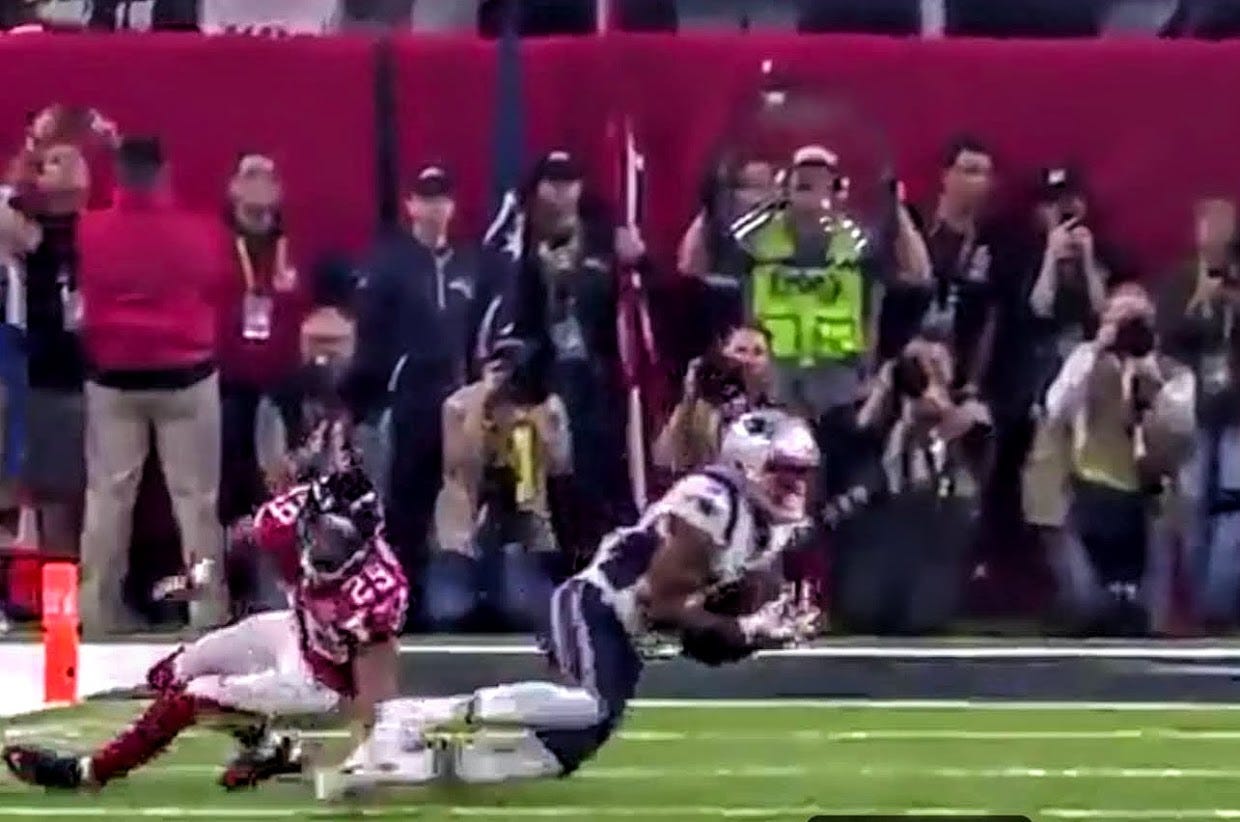
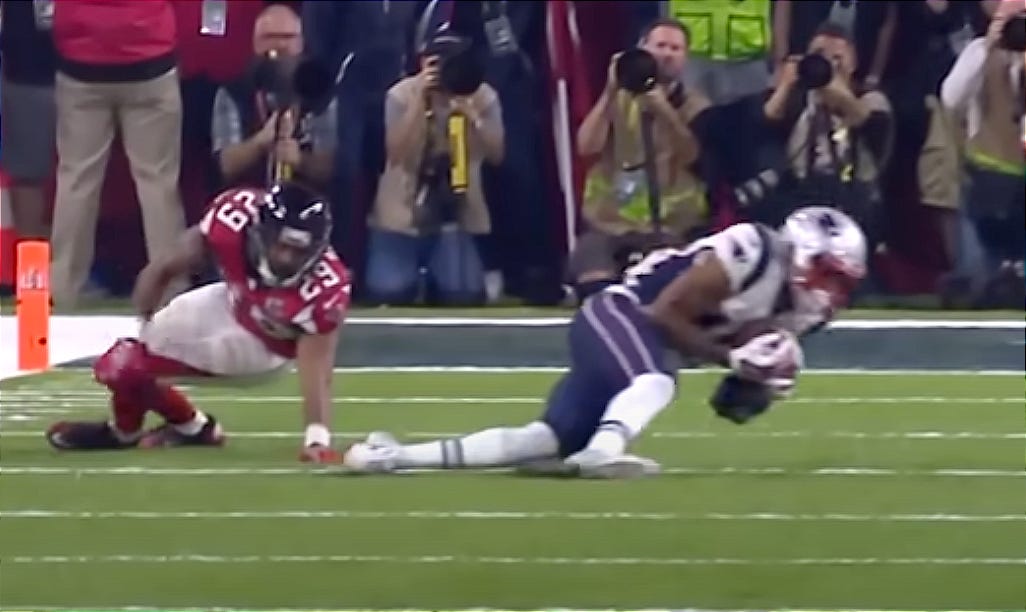
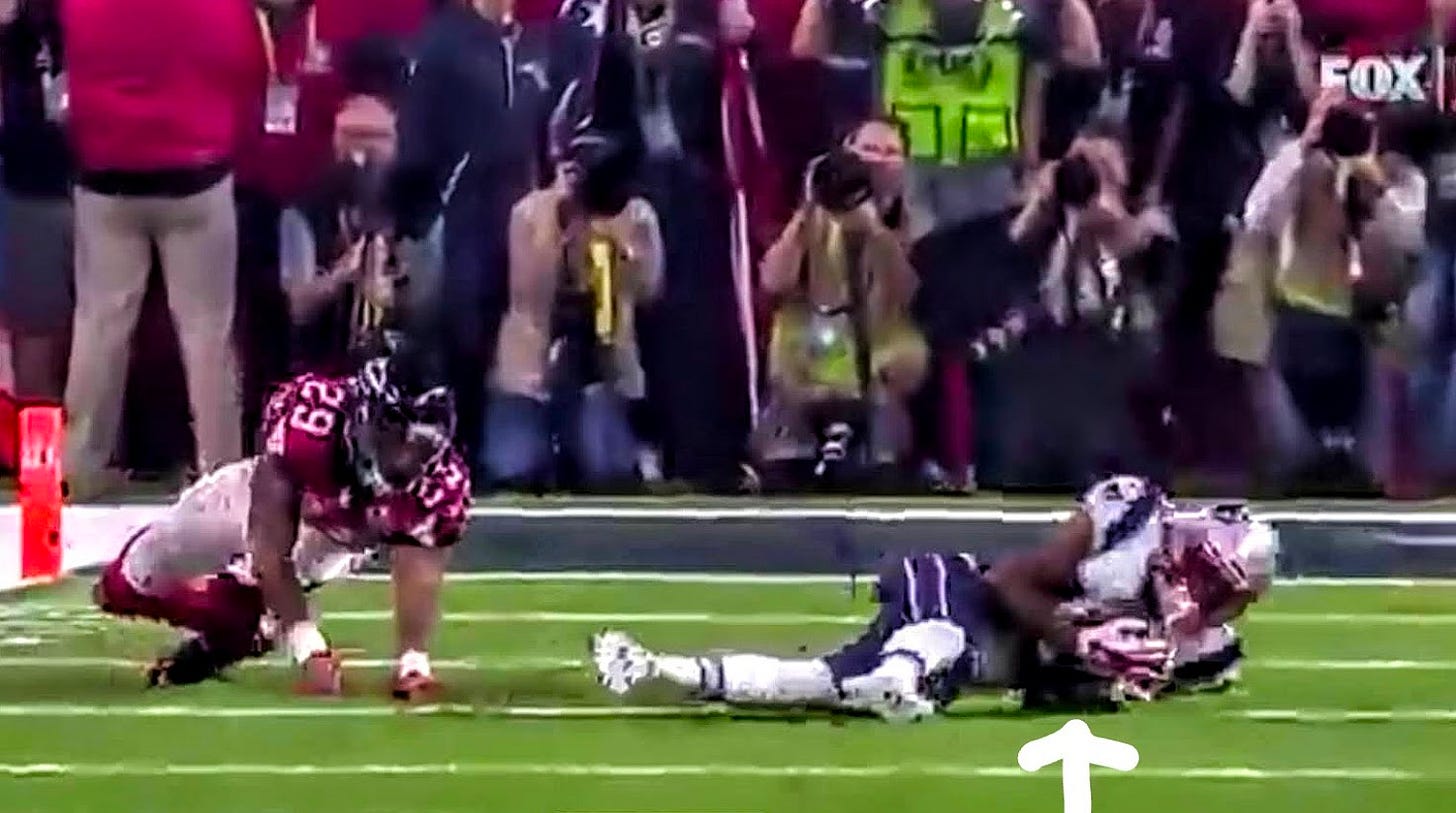
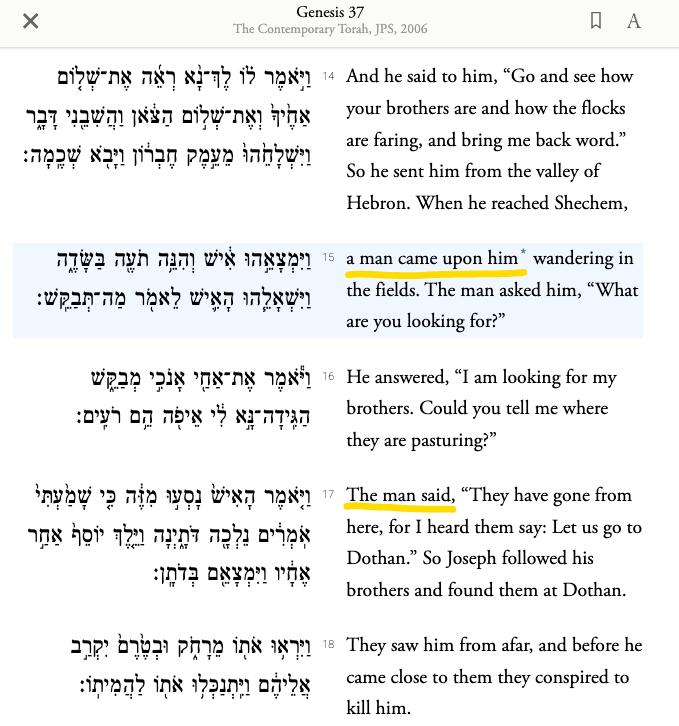
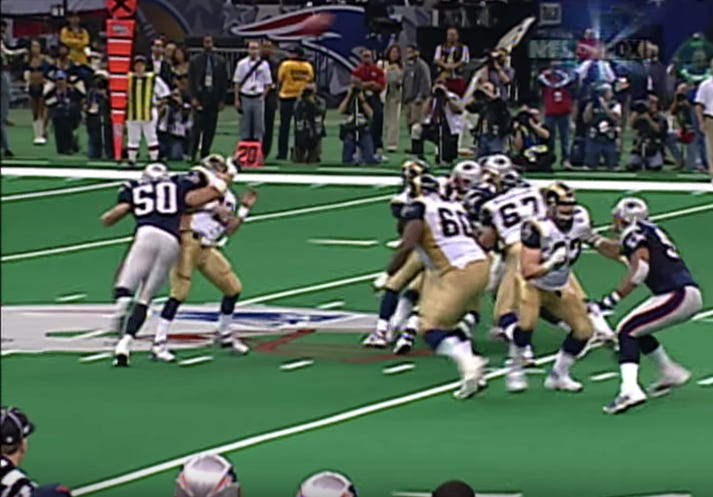
No comments:
Post a Comment